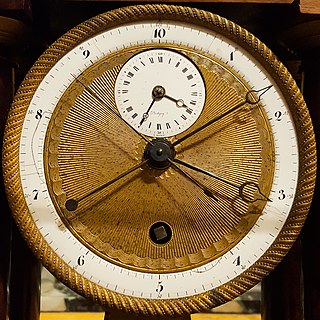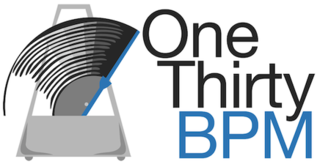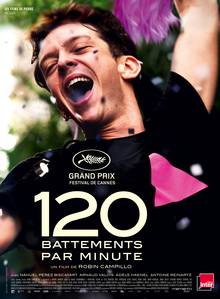
The hertz is the unit of frequency in the International System of Units (SI), often described as being equivalent to one event per second. The hertz is an SI derived unit whose formal expression in terms of SI base units is s−1, meaning that one hertz is one per second or the reciprocal of one second. It is used only in the case of periodic events. It is named after Heinrich Rudolf Hertz (1857–1894), the first person to provide conclusive proof of the existence of electromagnetic waves. For high frequencies, the unit is commonly expressed in multiples: kilohertz (kHz), megahertz (MHz), gigahertz (GHz), terahertz (THz).
Rhythm generally means a "movement marked by the regulated succession of strong and weak elements, or of opposite or different conditions". This general meaning of regular recurrence or pattern in time can apply to a wide variety of cyclical natural phenomena having a periodicity or frequency of anything from microseconds to several seconds ; to several minutes or hours, or, at the most extreme, even over many years.
In musical terminology, tempo, also known as beats per minute, is the speed or pace of a given composition. In classical music, tempo is typically indicated with an instruction at the start of a piece and is usually measured in beats per minute (BPM). In modern classical compositions, a "metronome mark" in beats per minute may supplement or replace the normal tempo marking, while in modern genres like electronic dance music, tempo will typically simply be stated in BPM.
In mathematics, a rate is the quotient of two quantities, often represented as a fraction. If the divisor in the rate is equal to one expressed as a single unit, and if it is assumed that this quantity can be changed systematically, then the dividend of the rate expresses the corresponding rate of change in the other (dependent) variable. In some cases, it may be regarded as a change to a value, which is caused by a change of a value in respect to another value. For example, acceleration is a change in velocity with respect to time

Rotational frequency, also known as rotational speed or rate of rotation, is the frequency of rotation of an object around an axis. Its SI unit is the reciprocal seconds (s−1); other common units of measurement include the hertz (Hz), cycles per second (cps), and revolutions per minute (rpm).
A nonstress test (NST) is a screening test used in pregnancy to assess fetal status by means of the fetal heart rate and its responsiveness. A cardiotocograph is used to monitor the fetal heart rate and presence or absence of uterine contractions. The test is typically termed "reactive" or "nonreactive".

Decimal time is the representation of the time of day using units which are decimally related. This term is often used specifically to refer to the French Republican calendar time system used in France from 1794 to 1800, during the French Revolution, which divided the day into 10 decimal hours, each decimal hour into 100 decimal minutes and each decimal minute into 100 decimal seconds, as opposed to the more familiar standard time, which divides the day into 24 hours, each hour into 60 minutes and each minute into 60 seconds.

A march, as a musical genre, is a piece of music with a strong regular rhythm which in origin was expressly written for marching to and most frequently performed by a military band. In mood, marches range from the moving death march in Wagner's Götterdämmerung to the brisk military marches of John Philip Sousa and the martial hymns of the late 19th century. Examples of the varied use of the march can be found in Beethoven's Eroica Symphony, in the Marches Militaires of Franz Schubert, in the Marche funèbre in Chopin's Sonata in B flat minor, the "Jäger March" in the Op. 91a by Jean Sibelius, and in the Dead March in Handel's Saul.
Revolutions per minute is a unit of frequency, commonly used to measure rotational speed.

Multifocal atrial tachycardia (MAT) is an abnormal heart rhythm, specifically a type of supraventricular tachycardia, that is particularly common in older people and is associated with exacerbations of chronic obstructive pulmonary disease (COPD). Normally, the heart rate is controlled by a cluster of cells called the sinoatrial node. When a number of different clusters of cells outside the SA node take over control of the heart rate, and the rate exceeds 100 beats per minute, this is called multifocal atrial tachycardia.

Military step or march is a regular, ordered and synchronized walking of military formations.
The inverse second or reciprocal second (s−1), also called per second, is a unit defined as the multiplicative inverse of the second. It is applicable for physical quantities of dimension reciprocal time, such as frequency and strain rate.

Beats Per Minute is a New York City– and Los Angeles–based online publication providing reviews, news, media, interviews and feature articles about the music world. Beats Per Minute covers a variety of genres and specializes in rock, hip hop, and electronic music.
Pressure rate product, within medical cardiology, specifically for cardiovascular physiology and exercise physiology is used to determine the myocardial workload.

BPM (Beats per Minute), also known as 120 BPM (Beats per Minute), (French: 120 battements par minute) is a 2017 French drama film directed by Robin Campillo and starring Nahuel Pérez Biscayart, Arnaud Valois and Adèle Haenel. The film is about the AIDS activism of ACT UP Paris in 1990s France. Campillo and co-screenwriter Philippe Mangeot drew on their personal experiences with ACT UP in developing the story.

The 30th European Film Awards were presented on 9 December 2017 in Berlin, Germany. The nominations and winners are selected by more than 2,500 members of the European Film Academy.

From tha Streets 2 tha Suites is the eighteenth studio album by American rapper Snoop Dogg. It was released on April 20, 2021 through Doggy Style Records. The album was released to celebrate 420.

The Course of the Inevitable is the fourth studio album by American rapper Lloyd Banks. It was released on June 4, 2021. It is his first full-length studio album since H.F.M. 2 (2010), and his first to be released since his departure from G-Unit Records in 2018.










